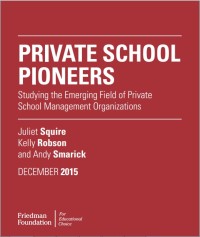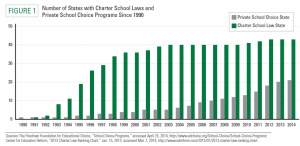Have you heard? School choice is a bit of a hot topic in Washington lately.
But whether — much less how — the federal government should help expand parental choice can be a thorny question.
Indiana Rep. Luke Messer is one of the biggest school choice advocates in Congress. He's also a federalist who wants to keep education policy decisions at the state level. But he's said repeatedly that there are still things federal lawmakers can do to expand educational options.
During an event hosted by the Hoover Institution, he said a school choice "cavalry" has arrived in the nation's capital, led by Education Secretary nominee Betsy DeVos.
"Frankly, this is a sea change in this movement," he said, echoing comments made Tuesday by Sen. Lamar Alexander, who chairs the panel vetting DeVos. "Her ideas are in the mainstream."
When the federal government and private school choice intersect, pundits often get confused. Two commonly distorted issues, federal mandates and school accountability, were batted around at the Hoover event.
Avoiding state mandates
Andy Smarick, a Maryland state Board of Education member and resident fellow at the American Enterprise Institute, said all the talk of federal school choice policy brings flashbacks of No Child Left Behind, Race to the Top, teacher evaluations — areas where states enacted reforms, then the federal government got involved, and wound up jeopardizing the policies by raising the political stakes. (more…)
A new report looks at a key aspect of the Catholic school renaissance we've explored before on this blog: The rise of private school management organizations — which, it turns out, are not confined to Catholic schools.
 The report, from the Friedman Foundation for Educational Choice, looks at the rise of these private school networks, which borrow some features from their cousins in the charter school world.
The report, from the Friedman Foundation for Educational Choice, looks at the rise of these private school networks, which borrow some features from their cousins in the charter school world.
Charter management organizations like KIPP and education management organizations like Charter Schools USA now run a third of America's charter schools, providing financial backing, back-office support and other advantages to schools in their networks.
According to the report, new organizations are starting to do similar things for private schools.
These budding private school management organizations (PSMOs) are independent entities that operate or help operate three or more private schools. They are a potentially important innovation in the supply of private schools.
The authors — Kelly Robson, Juliet Squire and Andy Smarick of Bellwether Education Partners — tracked down 14 organizations that meet their definition, which means they exist outside the government or existing church structures. Eight of the organizations have some kind of church affiliation. Most of those, including the two that are active in Florida, are Catholic. There's also a network of Lutheran schools. (more…)
As the debate continues over improving charter school quality in Florida, it might be worth following developments in Ohio. Legislators there are working on an overhaul of charter school laws.
In essence, they seem to be driving toward the kind of grand bargain that at least some charter school operators and district leaders have been talking about in Florida: Stronger accountability to screen out unqualified schools, coupled with greater access to school facilities (which is a major hurdle, and source of financial stress, for charter schools).
Some issues in Ohio don't apply in Florida. Ohio allows multiple authorizers, while in Florida, by and large, only districts can sponsor charters. "Sponsor shopping" isn't really possible here.
Other elements at the legislation, and the debate swirling around it, could apply here. Take these two excepts from testimony by Andy Smarick, a longtime charter school advocate and consultant with Bellwether Education Partners. The Thomas B. Fordham Institute recently posted his comments on Ohio's charter bill on its Flypaper blog.
A new report argues supporters of private school choice can learn from public charter schools and should look for ways to "break down the walls" between the two sectors.

While most states have authorized charter schools for more than a decade, private school choice programs are starting to become more widespread. Chart from the Friedman Foundation's report.
Private school choice programs serve only a few hundred thousand students nationally, a fraction of the 2.3 million enrolled in charters. But more states have created tax credit scholarship and voucher programs in recent years, and existing programs, including the tax credit and McKay scholarships in Florida, are growing.
A report released this morning by the Friedman Foundation for Educational Choice argues that as private school choice programs grow and proliferate, they can draw a few lessons from the charter sector about how to create more quality options for students.
Report author Andy Smarick - a consultant at Bellwether Education Partners who's among the leading proponents of a "three-sector approach" to education reform - writes that private schools could learn from charters' use of networks and incubators to improve their operations. He also advocates for a charter-style approach to accountability, in which participating schools get screened by authorizers — agencies that hold them to performance-based contracts in exchange for more freedom to operate.
That idea may prove controversial among private schools that have traditionally not seen as much regulation as their publicly funded counterparts. But as states debate how they will regulate private school choice programs, Smarick writes that authorizers would be in a position to fine tune their judgement calls about how private schools are evaluated. For example: Should they be publicly accountable for the performance of all their students, or just the performance of students who receive tuition subsidies through tax credit or voucher programs?
"The contractual relationship, if implemented properly, will also be more nuanced - rendering fairer judgments and respecting the unique characteristics of private schools - than, say, a single letter grade for a school that would be generated via a state’s accountability system," he writes.
Other insights from the charter sector are more straightforward, such as the use of incubators and networks. (more…)
In his keynote speech to a national gathering of faith-based educators in New York City last month, Andy Smarick offered several thoughtful ideas about how to regulate and expand access to faith-based schools. I agree with some of these ideas. I disagree with others.
 Here’s a rundown. I paraphrased Smarick’s positions for the sake of brevity.
Here’s a rundown. I paraphrased Smarick’s positions for the sake of brevity.
Smarick: Faith-based educators need to assume some responsibility for the decline in student enrollment in their schools. Families today have many schooling options and faith-based schools need to become more effective and efficient if they are to survive.
Me: I agree. Many of the faith-based schools our nonprofit, Step Up For Students, works with in Florida excel at providing children with safe and loving environments, but they need to improve their instructional practices. We recently launched an ambitious statewide partnership with scholarship schools and families to enhance their teaching and learning.
Smarick: Faith-based schools need to be more transparent with their student achievement data and do a better job using these data to help communicate their schools' effectiveness.
Me: I agree, but I also think faith-based schools and parents need to better integrate standardized test results into their improvement efforts.
Every Florida tax credit scholarship student is required to take a nationally normed standardized test yearly. But faith-based schools seldom, if ever, use these test results to inform instruction, and parents in faith-based schools seldom, if ever, review their children’s results, either. The limitations of standardized test data are well documented, but these limitations do not justify ignoring these data.
Smarick: Faith-based educators must become more politically engaged if they want government to enact public policies making faith-based schools more accessible to low-income and working-class families.
Me: I agree. Money to pay tuition and fees is the primary obstacle blocking low-income and working-class families from accessing faith-based schools. Thanks, in part, to the political engagement of Florida’s Catholic and Orthodox Jewish communities, Florida is slowly eradicating this impediment through two voucher programs (i.e., Voluntary Pre-Kindergarten and McKay Scholarships) and a tax credit scholarship. Florida’s faith-based school enrollment is increasing as a result. The tax credit program is serving 30,000 more low-income students this year than it did just four years ago.
Smarick: The school should be the unit of analysis and improvement. Our goal is not to create great school systems, but great systems of schools.
Me: I agree and disagree. (more…)
Few people in the field of education bring the kind of credibility to a debate on faith-based schools that Andy Smarick brings. So his keynote speech Tuesday to the American Center for School Choice’s Commission on Faith-based Schools in New York was all the more riveting for his decision not to preach to the choir. His message – that to reverse the decline, faith-based educators need also to look in the mirror – amounted to a family intervention.
“Without putting too fine of a point on it,” Smarick said, “an H.G. Wells quote seems particularly fitting: ‘Adapt or perish, now as ever, is nature’s inexorable imperative.’ ”
Smarick criticized faith-based schools – and private schools in general – for not adapting to a new educational environment driven by regulatory accountability and performance measures, and for not being more transparent about their academic performance. He challenged a passage in the commission's report:
“The following paragraph from your report is particularly instructive: 'America is losing a valuable national asset — not because it has become obsolescent, not because the demand for it has disappeared, not because the need for it has been satisfied by other entities, but because we have a misguided public policy … '
“It is my humble contention that these policies are misguided as much because of our behavior as anyone else’s. I’m sad to say, most believe we currently don’t deserve better policies. Our elected officials are understandably making education decisions based on the conditions of 2013, and we’re acting like it’s 1963.”
The public and charter sectors are transparent in ways that better inform parents and satisfy the demands of those in government who pay the bills, Smarick told the audience. So private schools that want to constitute a viable third sector need to embrace the reality seen in most Western nations: (more…)
 Last year, 43 percent of Florida’s PreK-12 students attended a school other than their assigned neighborhood school. This enthusiastic embrace of school choice by parents is forcing school boards to rethink their roles and responsibilities. Should they fight to prevent parents from attending non-district schools? Or should they embrace parent empowerment and help ensure all their community’s students have access to the schools - neighborhood, magnet, charter, virtual or private - that best meet their needs?
Last year, 43 percent of Florida’s PreK-12 students attended a school other than their assigned neighborhood school. This enthusiastic embrace of school choice by parents is forcing school boards to rethink their roles and responsibilities. Should they fight to prevent parents from attending non-district schools? Or should they embrace parent empowerment and help ensure all their community’s students have access to the schools - neighborhood, magnet, charter, virtual or private - that best meet their needs?
This dilemma was on full display at a recent Palm Beach County, Fla. school board meeting. The board was reviewing what to do about three struggling charter schools when one board member, Marcia Andrews, suggested the board should do more to help these schools succeed. “We’ve got to kind of change how we do business,” she said, according to the Palm Beach Post, “so they’ll know we’ll partner with them, so they’ll be successful.”
Some of her colleagues disagreed. They argued that when parents choose charter schools they take their funding with them and that hurts the district. They also worried about the costs of helping charter schools when district budgets are already stretched tight.
This caused another board member, Frank Barbieri, to join Andrews in calling for greater collaboration and support. “I don’t want to hear about ‘we’re taking money from our kids and giving it to these kids,’ ” said Barbieri. “These are our kids. Let’s help them.”
Statistics from Florida’s tax credit scholarship program, which I help administer, support the these-are-all-our-kids position. (more…)